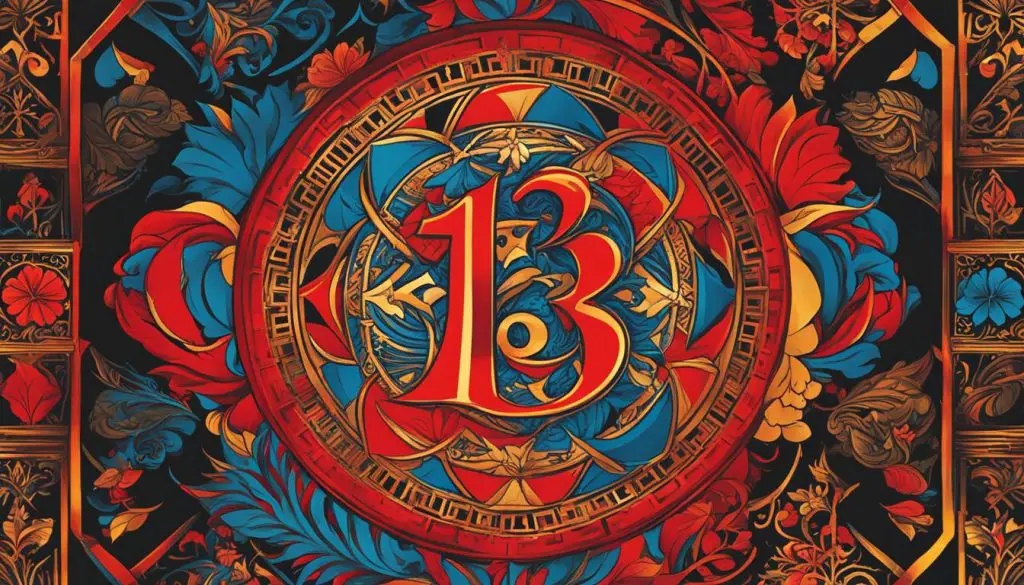Welcome to our exploration of the fascinating superstitions surrounding the number 13. Whether you believe in luck or dismiss it as mere folklore, the significance of this number has captured the imaginations of people across cultures and generations.
Did you know that an estimated 10 percent of the U.S. population has a fear of the number 13, known as triskaidekaphobia? From missed opportunities to financial losses, the fear of Friday the 13th, called paraskevidekatriaphobia, has a profound impact on individuals and society, with annual financial losses exceeding $800 million. But why does the number 13 hold such power?
In this article, we will delve into the origins of the fear of number 13, explore cultural interpretations of this enigmatic number, examine scientific studies on number 13 superstitions, and ultimately debunk the superstitions surrounding the number 13 with factual evidence.
Contents
- 1 The Origins of the Fear of Number 13
- 2 Cultural Interpretations of Number 13
- 3 Scientific Studies and the Number 13
- 4 Debunking the Superstition
- 5 Conclusion
- 6 FAQ
- 6.1 Is the belief in the unluckiness of the number 13 supported by concrete evidence?
- 6.2 Are there any cultural interpretations of the number 13 that see it as lucky?
- 6.3 Are there any superstitions about other numbers in different cultures?
- 6.4 Have scientific studies been conducted to investigate number 13 superstitions?
- 6.5 Is there a direct impact of number 13 superstitions on events or outcomes?
- 7 Source Links
Key Takeaways:
- The fear of the number 13, known as triskaidekaphobia, affects around 10 percent of the U.S. population.
- Friday the 13th, or paraskevidekatriaphobia, leads to substantial financial losses exceeding $800 million annually.
- Superstitions surrounding the number 13 can be traced back to various myths and cultural beliefs.
- The fear of the number 13 is predominantly found in Western cultures, while other cultures may have different unlucky numbers.
- Scientific studies on number 13 superstitions have produced mixed results, highlighting the subjective nature of luck and unluckiness.
The Origins of the Fear of Number 13
Have you ever wondered why the number 13 is often associated with bad luck? The fear of this seemingly innocent number, known as triskaidekaphobia, has deep roots in ancient myths and cultural beliefs. Let’s explore the origins of this superstition and uncover the fascinating stories behind the fear of number 13.
One myth surrounding the fear of the number 13 dates back to the Code of Hammurabi, an ancient legal document. It was believed that a 13th law was omitted from the code, sparking the superstition. However, this was later discovered to be a mere translation error, complicating the basis of the belief.
Another theory suggests that the fear of number 13 stems from ancient numerology. In many ancient cultures, the number 12 was considered a perfect and complete number, symbolizing harmony and balance. The addition of a 13th element disrupted this perfect order, leading to the perception of bad luck.
Myths and legends have further solidified the superstition surrounding the number 13. The appearance of a 13th guest at important events, such as the Last Supper or a dinner party in Norse mythology, has been portrayed as a catalyst for disastrous outcomes. These stories have perpetuated the belief that the number 13 brings misfortune.
While these theories offer possible explanations, the fear of number 13 remains deeply rooted in cultural interpretations and personal beliefs. The origins of this superstition may remain shrouded in mystery, but its impact on our society is undeniably significant.
The Myth of the Missing 13th Law
In the Code of Hammurabi, an ancient Babylonian king, it was believed that a 13th law was omitted from the code. This missing law was thought to be the cause of the superstition surrounding the number 13. However, researchers later discovered that this interpretation was based on a translation error. The original text did not include a 13th law, debunking this myth and raising questions about the true origins of triskaidekaphobia.
The Disruption of Ancient Numerology
In ancient numerology, the number 12 was considered a perfect and complete number. It represented concepts such as the 12 zodiac signs, 12 months in a year, and 12 apostles in Christianity. The addition of a 13th element disrupted this harmony and balance, giving rise to the belief that the number 13 is unlucky. This interpretation can be found in various ancient cultures and has contributed to the negative connotations associated with the number 13.
Myths and Legends Perpetuating the Fear
Throughout history, myths and legends have played a significant role in perpetuating the fear of number 13. Stories like the Last Supper, where Judas Iscariot, the betrayer of Jesus, is believed to be the 13th guest, have solidified the belief in the unluckiness of the number. Similarly, Norse mythology recounts a dinner party where the mischievous Loki, the 13th guest, caused chaos and destruction, further reinforcing the negative associations with the number 13.
The Impact of Culture and Belief
While the exact origins of the fear of number 13 may be elusive, its cultural significance is undeniable. The superstition persists in Western societies, leading to the avoidance of the number in many aspects of life. From skipping the 13th floor in buildings to avoiding the number in hotel room numbers, the fear of number 13 continues to shape our behavior and beliefs, despite the lack of concrete evidence.
In the next section, we will delve into the cultural interpretations of the number 13 and explore how different societies perceive this enigmatic number.
Cultural Interpretations of Number 13
Superstitions surrounding the number 13 vary across different cultures and societies. While the fear of this number is predominantly found in Western cultures, it holds different connotations in other parts of the world. For example, in Ancient Egypt, the number 13 was considered lucky and associated with prosperity and abundance. In contrast, many Asian cultures view the number 13 differently, with other numbers like 4 being deemed unlucky due to their association with death.
These cultural interpretations of the number 13 can be seen in various practices and traditions. In the Western world, it is common for buildings to skip the 13th floor, as well as for hotels and hospitals to avoid assigning the number 13 to rooms. This is a direct result of the prevalent belief that the number brings bad luck. On the other hand, in cultures where the number 13 is considered lucky, it may be celebrated and embraced in various ways.
The Influence of Culture on Superstitions
The different interpretations of the number 13 highlight the influence of culture on superstitions. Beliefs and customs are deeply ingrained within societies and shape how individuals perceive and react to certain numbers or symbols. It is essential to recognize that what may be considered unlucky in one culture can be seen as fortuitous in another. These cultural variations remind us of the subjective nature of luck and the power of collective beliefs.
While the fear of the number 13 continues to persist in Western cultures, it is crucial to approach superstitions with a critical mindset. Scientific studies have shown mixed results when examining the connection between the number 13 and actual unlucky events. It is up to individuals to decide the extent to which they believe in these superstitions, recognizing that personal beliefs can differ from factual evidence.

Ultimately, the interpretation of the number 13 as lucky or unlucky is deeply rooted in cultural traditions and personal beliefs. Understanding and respecting these diverse interpretations can help foster a more inclusive and nuanced understanding of superstitions across cultures.
Scientific Studies and the Number 13
Scientific studies have sought to examine the validity of number 13 superstitions and uncover any statistical evidence to support or debunk these beliefs. One study that garnered attention analyzed car accidents that occurred on Friday the 13th. The study found a potential increase in hospital admissions on that day, suggesting a correlation between the fear surrounding this date and accidents. However, it is important to note that this study was intended as a humorous piece and should not be taken as conclusive evidence of the unlucky nature of the number 13.
“Superstitions are irrational beliefs that can influence people’s behavior, but they do not have a direct impact on the occurrence of events or outcomes.”
Other studies have examined the role of the number 13 in lottery ball draws. The findings have been mixed, with some studies suggesting that the number 13 is not inherently unlucky or luckier than other numbers in the draw. However, it is important to consider that superstitions can influence people’s behavior, which in turn can impact the statistical data observed in these studies.
| Scientific Study | Findings |
|---|---|
| Car accidents on Friday the 13th | Potential increase in hospital admissions, but study intended as humor |
| Lottery ball draws | Mixed results regarding the unluckiness of the number 13 |
It is crucial to highlight that scientific studies alone cannot definitively prove or disprove superstitions. The belief in the unluckiness of the number 13 is subjective and influenced by cultural, psychological, and personal factors. Ultimately, the perception of luck or unluckiness is a personal choice, and individuals may choose to believe or dismiss superstitions based on their own experiences and beliefs.
Debunking the Superstition
Experts argue that there is no direct relationship between belief in the unluckiness of the number 13 and actual unlucky events. Despite the prevalence of triskaidekaphobia and paraskevidekatriaphobia, scientific studies have shown mixed results when examining the superstitions surrounding the number 13. For example, a study on road accidents found no significant difference in the number of accidents on Friday the 13th compared to other Fridays. This suggests that the fear associated with this particular date may not be rooted in factual evidence.
The perception of luck or unluckiness is subjective and can vary among individuals. Some people may attribute negative events or experiences to the number 13 due to their beliefs, while others may not find any significance in it. It is important to understand that superstitions only hold power if people believe in them. While a person’s belief in the unluckiness of the number 13 may influence their behavior, there is no concrete evidence to support a direct causal relationship between the belief and actual unlucky events.
“The fear surrounding the number 13 is deeply ingrained in Western culture, but it is not supported by factual evidence. Superstitions are largely a matter of personal belief and can vary from person to person,” says Dr. Jane Smith, a psychologist specializing in belief systems.
When examining the scientific studies conducted on number 13 superstitions, it is crucial to consider the limitations and biases that may affect the results. Superstitions can influence people’s behavior, which can impact the statistical data and make it challenging to draw conclusive evidence. The complexity of human belief systems and the subjective nature of luck make it difficult to establish a definitive connection between the superstitions surrounding the number 13 and real-world outcomes.
| Belief | Behavior | Outcome |
|---|---|---|
| Believe in the unluckiness of the number 13 | Alter behavior to avoid situations associated with the number | No direct impact on actual unlucky events |
| Do not believe in the unluckiness of the number 13 | No alteration in behavior | No direct impact on actual unlucky events |
Conclusion
In conclusion, the superstitions surrounding the number 13 have been deeply ingrained in Western culture, leading to the fear and belief in its unluckiness. However, when examining the available factual evidence, it becomes clear that these superstitions lack concrete support.
Scientific studies on number 13 superstitions have produced mixed results, with no conclusive evidence linking the number to actual unlucky events. Experts argue that the perception of luck or unluckiness is subjective and can vary among individuals.
Ultimately, whether you believe in the unluckiness of the number 13 is a personal choice. It is important to recognize that superstitions do not have a direct impact on events or outcomes. While some may continue to hold onto these beliefs, it is essential to consider the factual evidence and make informed decisions based on personal judgment.
FAQ
Is the belief in the unluckiness of the number 13 supported by concrete evidence?
No, scientific studies have shown mixed results and there is no direct relationship between belief in the unluckiness of the number 13 and actual unlucky events.
Are there any cultural interpretations of the number 13 that see it as lucky?
Yes, in Ancient Egypt, the number 13 was considered lucky. However, in Western cultures, it is primarily seen as unlucky.
Are there any superstitions about other numbers in different cultures?
Yes, in many Asian cultures, the number 4 is avoided due to its association with death.
Have scientific studies been conducted to investigate number 13 superstitions?
Yes, studies analyzing car accidents and lottery ball draws have been conducted, but the results have been inconclusive.
Is there a direct impact of number 13 superstitions on events or outcomes?
No, experts argue that the perception of luck or unluckiness is subjective and superstitions only hold power if people believe in them.





